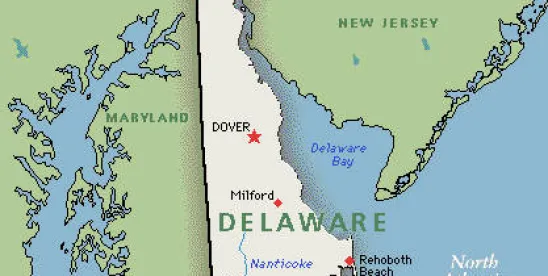The Delaware Supreme Court held yesterday that the dismissal of a shareholder derivative action for lack of demand futility can preclude other derivative actions as long as the plaintiff in the dismissed case adequately represented the corporation's interests. The Court's January 25, 2018 decision in California State Teachers' Retirement System v. Alvarez – a suit brought on behalf of Wal-Mart Stores, Inc. – refused to adopt the Delaware Court of Chancery's recommendation that, as a matter of federal due process, a judgment in one derivative action should not bind the corporation or its stockholders in another derivative action unless either (i) the first action has survived a motion to dismiss because a pre-suit demand on the corporation's board of directors would have been futile or (ii) the board has given the plaintiff authority to proceed on the corporation's behalf by declining to oppose the derivative suit.
The Court's decision should enhance derivative defendants' ability to obtain dismissal of duplicative derivative actions on preclusion grounds where a similar case has been dismissed because of lack of demand futility. But, if it does not discourage the filing of duplicative suits, the ruling also might cause derivative plaintiffs to take steps to appear in multiple forums to try to avoid preclusion risks.
Background
Court of Chancery's Original Decision
The dueling derivative actions at issue here began in the wake of an alleged bribery scandal involving a Wal-Mart subsidiary. Lawsuits asserting claims for breach of fiduciary duty against Wal-Mart's directors and officers were filed in Arkansas federal court and in the Delaware Court of Chancery.
During an initial conference in Delaware, the court warned plaintiffs' counsel that their complaints likely would not survive a motion to dismiss, and it urged counsel to take the time to examine Wal-Mart's books and records pursuant to § 220 of the Delaware General Corporation Law. The Delaware plaintiffs did so and spent nearly three years litigating their demand for corporate books and records. The Arkansas plaintiffs, in contrast, chose to proceed solely on the basis of publicly available information, and they asserted claims under Delaware and federal law. The Arkansas court eventually dismissed the case based on the plaintiffs' failure to show that making a demand on Wal-Mart's board before suing would have been futile.
Defendants then argued in Delaware that the Arkansas decision collaterally estopped the Delaware plaintiffs from raising demand futility in response to defendants' motion to dismiss. Chancellor Bouchard applied Arkansas preclusion principles and agreed that the Delaware plaintiffs' derivative claims were barred. The Delaware plaintiffs appealed.
Delaware Supreme Court's First Decision
The Delaware Supreme Court did not disagree with the Court of Chancery's analysis of Arkansas preclusion law as to two key elements of collateral estoppel: "whether the issue to be precluded [i.e., demand futility] was actually litigated" and whether the parties potentially subject to preclusion had been adequately represented in the first proceeding. The Court expressed "some sympathy" for the Delaware plaintiffs' plight, because those plaintiffs had "heeded the Chancellor's advice" to take the time to demand corporate books and records, while "the [Arkansas] plaintiffs who did not heed those warnings suffered dismissal of their complaint with the ultimate effect of barring the action of the Delaware Plaintiffs, who spent nearly three years fighting the books and records battle." However, the Court chided the Delaware plaintiffs for not seeking to intervene or otherwise participate in the Arkansas litigation "once it became apparent that the stay of the Arkansas litigation would be lifted and the judge warned that her decision would likely have preclusive effect."
The Court also was satisfied that the Chancellor had correctly applied Arkansas law in holding that the Delaware shareholders were in privity with the Arkansas shareholders, inasmuch as the real party in interest in both cases was the corporation. But the Court believed that the Chancellor had not sufficiently addressed the Delaware plaintiffs' federal due-process argument against preclusion. It therefore remanded the case so the Chancellor could focus on that issue.
Court of Chancery's Decision on Remand
On remand, the Chancellor recommended that the Supreme Court adopt a rule that a judgment in one derivative case should not bind the corporation or other stockholders in another derivative action "until the [first] action has survived a Rule 23.1 motion to dismiss [because of demand futility], or the board of directors has given the plaintiff authority to proceed by declining to oppose the suit." The Chancellor based his recommendation on "(1) the similarities between class actions and derivative actions, (2) some of the realities of derivative litigation, and (3) public policy considerations."
First, the Chancellor noted "significant similarities between class and derivative actions" and reasoned that, "[w]hen a court denies a stockholder the authority to sue on behalf of the corporation by granting a Rule 23.1 motion to dismiss [for failure to establish demand futility], the purported derivative action is no more a representative action than" is an uncertified class action, in which a judgment cannot bind absent class members.
Second, the Chancellor observed that "[t]he need for a more rigorous preclusion rule in the derivative action context is heightened by the disparity between class and derivative actions in terms of how adequacy of representation is assessed in practice." A putative class representative must establish that he, she, or it can adequately represent the putative class. But in a derivative action, "the burden is on the defendant to show that the plaintiff is an inadequate representative." Moreover, "defendants often have an incentive not to challenge adequacy in an initial derivative action" if they believe that the first case is vulnerable to a motion to dismiss, with the possibility of precluding subsequent derivative actions.
Third, the Chancellor was concerned about the public-policy issues that arise in "fast-filer" situations, where one plaintiff hastily files a potentially weak derivative action while another plaintiff – as here – takes time to go through the more arduous process of obtaining corporate books and records in order to prepare a more detailed and refined complaint. "In these cases, the second court presumably would be understandably cautious about following earlier rulings in cases brought by less prepared stockholders."
For all of these reasons, the Chancellor recommended that the Delaware Supreme Court rule that a judgment in one derivative action cannot preclude another derivative action unless the stockholder in the first case had been empowered by either a court or the corporation's board of directors to assert the corporation's claims.
Delaware Supreme Court's Decision
The Supreme Court rebuffed the Chancellor's suggested standard for assessing the preclusive effect of prior determinations of demand futility. Noting that federal law governs the evaluation of due-process concerns, the Court observed that three federal Courts of Appeals "have already addressed whether granting preclusive effect to prior determinations of demand futility violates Due Process, and they each arrived at the same conclusion: the Due Process rights of subsequent derivative plaintiffs are protected, and dismissal based on issue preclusion is appropriate, when their interests were aligned with and were adequately represented by the prior plaintiffs."
Alignment of Interests
The Court ruled that an alignment of interests (sometimes called privity) exists under federal and Arkansas law where "the person arguably precluded is so identified in interest with the former litigant that she represents the same legal right." The Court found such an alignment of interests here because both the Arkansas and the Delaware plaintiffs sought to represent the same real party in interest: the corporation.
Derivative actions conceptually involve two steps: (i) the stockholder plaintiff's litigation of his, her, or its alleged right to assert the corporation's claim, and (ii) the litigation of the underlying claim itself, if the court or the corporation's board allows the stockholder to do so. However, "through the entire process, the corporation alone is the real party in interest because the suit is always on its behalf."
The Court thus rejected the notion that "[t]he 'dual' nature of the derivative action" transforms the first step into "an individual claim belonging to the stockholder." "The named plaintiff, at this stage, only has standing to seek to bring an action by and in the right of the corporation and never has an individual cause of action." Accordingly, even where – as here – multiple derivative actions have been filed, "differing groups of stockholders who seek to control the corporation's cause of action share the same interest and therefore are in privity."
Adequacy of Representation
Relying on U.S. Supreme Court precedent, the Delaware Supreme Court held that "[a] party's representation of a nonparty is adequate for preclusion purposes" if (i) "the interest of the nonparty and her representative [is] aligned," (ii) "either the party understood herself to be acting in a representative capacity or the original court took care to protect the interests of the nonparty," and (iii) notice is "sometimes" given. The Court concluded that all three requirements had been met here.
-
The privity analysis discussed above "satisfies the alignment-of-interests requirement."
-
The record in the case showed that both the Arkansas and the Delaware plaintiffs had "understood that a judgment in their case could impact the other stockholders." In fact, the Arkansas court and the Delaware plaintiffs had raised that very issue.
-
Although "federal courts have signaled that derivative suits are situations where notice is not required to comply with Due Process," the Delaware Supreme Court did not see a need to resolve that abstract legal issue, "as it is undisputed that Delaware Plaintiffs had notice of the Arkansas action in this instance."
The Court also recognized that federal courts – following the Restatement (Second) of Judgments – have sought to ensure that "the prior representative must not have failed to prosecute or defend the action with due diligence and reasonable prudence such that the opposing party was on notice of facts making that failure apparent." This standard has two parts: (i) "the quality of the representation . . . must not have been grossly deficient," and (ii) conflicts of interest must not have existed. The Court concluded that both criteria had been met.
-
The Court acknowledged that the Delaware plaintiffs had taken the time to seek Wal-Mart's books and records, while the Arkansas plaintiffs had proceeded without doing so – and had had their case dismissed for lack of demand futility. In terms of quality of representation, the Court observed that "[w]e might see this as a closer call if the Arkansas Plaintiffs had not obtained any documents . . . . But that is not the case." A news article had provided links to internal corporate memos, and the Arkansas plaintiffs had relied on those documents (albeit unsuccessfully) in their pleading. Thus, "[a]lthough it might have been a tactical error, the Arkansas Plaintiffs' decision to forgo a Section 220 demand in this instance does not rise to the level of constitutional inadequacy."
-
The Court held that no conflict of interest existed between the Arkansas and the Delaware plaintiffs, and it implicitly rejected the Delaware plaintiffs' argument that a conflict had existed because the Arkansas plaintiffs' counsel allegedly had sought to promote their own economic interests by litigating in Arkansas despite the Delaware Chancellor's "warning that plaintiffs should seek Company books and records."
Implications
The Delaware Supreme Court's decision should facilitate dismissal of derivative actions on preclusion grounds where a prior, related case has been dismissed based on the plaintiff's failure to show that a pre-suit demand on the corporation's board would have been futile. The Court's rejection of the notion that the first step of a derivative action consists of the stockholder's individual claim – his, her, or its own alleged right to assert the company's claim – undermines an anti-preclusion argument that had been circulating in the Court of Chancery for several years and that two members of that court had endorsed.
The decision also raises a number of legal issues and strategy choices that will likely be explored in future cases.
First, now that the Delaware Supreme Court has held that a dismissal on demand-futility grounds can preclude other derivative actions without raising due-process concerns, will stockholders and their lawyers be more careful about pressing forward in first-filed cases, especially fast-filed ones? Will they take the time to pursue books-and-records demands (as did the Delaware plaintiffs), or will they plow ahead at the risk of having less-developed claims (as did the Arkansas plaintiffs)? Of course, the corollary to this point is that the decision could increase the number of books-and-records demands under § 220 – a step that the Delaware courts have urged for many years.
Second, will the decision cause plaintiffs in multi-forum derivative litigation – or those who are pursuing books-and-records demands before suing – to appear in each of the relevant courts? The Supreme Court criticized the Delaware plaintiffs' failure to participate in the Arkansas litigation and, in its prior decision, had cited otherwise inapplicable New York law holding that shareholders who are denied intervention will not be precluded in subsequent derivative actions. The Court might have retreated a bit in its latest decision, observing that, "although formal intervention is not required, there were other potential avenues to ensure that [the Delaware plaintiffs] would not be precluded, or at least have a more compelling argument before this Court that the Arkansas Plaintiffs failed to adequately represent them. Such measures include filing a statement of interest . . . and participating as amici curiae to inform the Arkansas court of their concerns. Though such other measures are not required either, we simply note that Delaware Plaintiffs' awareness of the potential for collateral estoppel, combined with their failure to coordinate with the Arkansas Plaintiffs and failure to express their concerns to the Arkansas court, suggest that all the equities may not favor the Delaware Plaintiffs here." Future plaintiffs – especially those who take the time to pursue books-and-records demands – might therefore seek to create "more compelling argument[s]" for themselves by making some form of appearance in a related case that is proceeding at a faster pace.
Third, the decision might encourage some plaintiffs to include federal securities claims (such as alleged proxy violations) – over which federal courts have exclusive jurisdiction – together with their state-law fiduciary-duty claims, as did the Arkansas plaintiffs here. The existence of those federal claims in the Wal-Mart derivative litigation had led the Eighth Circuit Court of Appeals to vacate the Arkansas district court's open-ended stay pending the Delaware litigation. A derivative plaintiff intent on proceeding without taking time for a books-and-records demand might therefore sue in federal court and plead a federal-law claim in addition to state-law claims in an effort to avoid a stay of the case pending proceedings in Delaware.
Fourth, the Court's adequacy-of-representation analysis turned on the factual conclusions that (i) both the Arkansas and the Delaware plaintiffs had fully "understood that a judgment in their case could impact the other stockholders" and (ii) the Delaware plaintiffs had had actual notice of the Arkansas action even though notice of that proceeding had not been sent or published to stockholders. The decision thus theoretically leaves open the legalquestions whether preclusion is permissible if (i) the plaintiff in the first case did notunderstand that a judgment could bind other stockholders and/or (ii) the plaintiff against whom preclusion is asserted did not know about the other derivative action. As a practical matter, these theoretical scenarios might not arise too often – but they could, and the factual differences could affect the preclusion analysis.
Fifth, the case shows Delaware courts' continued discomfort with "fast filers" – but also demonstrates the Supreme Court's refusal to hold as a matter of law that fast filing is inconsistent with adequate representation. The Court did not need to grapple directly with that issue here, because it concluded as a factual matter that, even though the Arkansas plaintiffs had ignored Delaware jurisprudence recommending use of books-and-records demands, the plaintiffs had not lacked access to any internal corporate documents. Documents had been available in the public domain, and the plaintiffs had used those materials in their pleadings. But a different set of facts could conceivably lead to a different result in another case.
Sixth, the case illustrates the importance of forum-selection bylaws, which Delaware courts have repeatedly upheld. Such bylaws could concentrate the litigation in a single forum – although they will not necessarily work where, as here, one case (the Delaware action) asserts only state-law claims, while another case (the Arkansas action) pleads both state-law claims as well as federal-law claims that are subject to exclusive federal jurisdiction.





 />i
/>i

